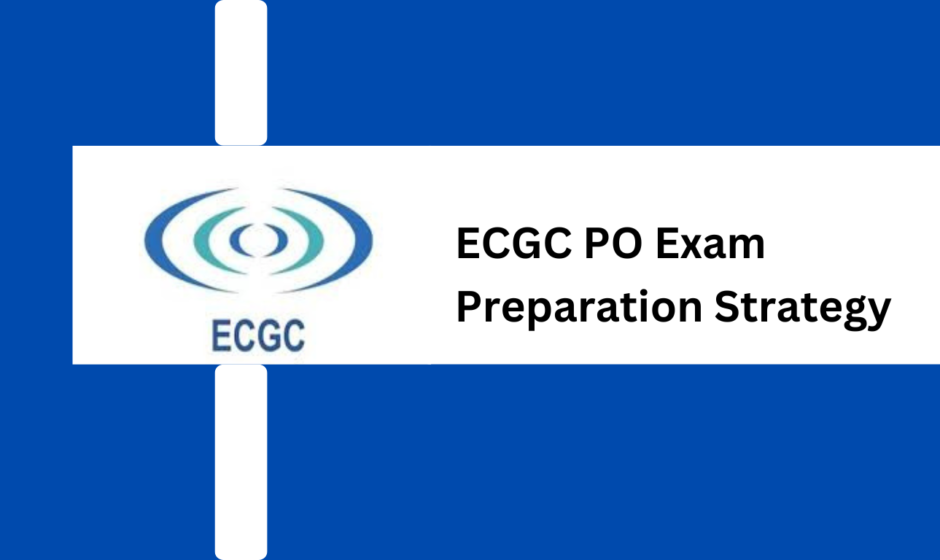Preparing for the ECGC PO Exam in just 30 days might seem like a tough task, but with the right strategy and focused effort, it is achievable. The ECGC PO (Export Credit Guarantee Corporation of India Probationary Officer) exam is highly competitive, and candidates are expected to have a thorough understanding of various subjects. However, a well-structured plan, effective time management, and proper resources can help you make the most out of the limited time available. In this article, we’ll walk you through a 30-day strategy to clear the ECGC PO exam successfully.
Understanding the ECGC PO Exam
Before diving into the preparation strategy, it’s essential to have a clear understanding of the exam pattern. The ECGC PO exam consists of two stages:
Online Objective Test: This part includes sections like Reasoning Ability, English Language, Computer Knowledge, General Awareness, and Quantitative Aptitude.
Descriptive Paper: This part tests your essay and precis writing skills in the English language.
Interview: After clearing the objective and descriptive tests, candidates are called for a personal interview round.
Exam Pattern in Detail
Here’s a breakdown of the ECGC PO online exam:
Reasoning Ability: 50 questions, 50 marks
English Language: 40 questions, 40 marks
Computer Knowledge: 20 questions, 20 marks
General Awareness: 40 questions, 40 marks
Quantitative Aptitude: 50 questions, 50 marks
The descriptive paper consists of:
Essay Writing: 20 marks
Precis Writing: 20 marks
Understanding the exam structure is key to forming an effective study plan.
30-Day Study Plan to Clear ECGC PO Exam
The following study plan breaks down your preparation into manageable daily tasks over the next 30 days. The focus will be on covering the ECGC PO syllabus comprehensively while revising key topics and practicing mock tests.
Days 1-5: Focus on Basics
During the first five days, your goal should be to get familiar with the basic concepts of all the sections. Since the syllabus is vast, you need to split your time between each section carefully.
Reasoning Ability: Begin by understanding common topics such as puzzles, seating arrangements, syllogism, and coding-decoding. Focus on learning the basic approach to solve these questions.
English Language: Start with reading comprehension, basic grammar rules, and error detection. These are crucial topics that carry significant weight.
Computer Knowledge: Study basic computer terms, Microsoft Office, Internet, networking, and software basics. These questions are often straightforward but need revision.
General Awareness: For this section, concentrate on current affairs from the last 6 months. Keep a daily habit of reading newspapers and noting important facts related to economics, international organizations, and trade policies, which are especially relevant for ECGC.
Quantitative Aptitude: Focus on core topics like percentages, profit and loss, time and distance, and number series. Build your speed by practicing 20-30 questions daily from each topic.
Days 6-10: Topic-wise Study and Practice
With the basics in place, spend the next five days diving deeper into each section. Begin practicing questions topic-wise and build speed.
Reasoning Ability: Practice more advanced puzzles, seating arrangements, and input-output. Try solving at least 4-5 puzzles each day to improve speed.
English Language: Move on to more complex reading comprehension passages and focus on vocabulary. Learning new words daily can help you with synonym-antonym questions and improve your reading ability.
Computer Knowledge: Study networking protocols, cybersecurity, and database management in detail. Practice solving basic questions.
General Awareness: Continue revising current affairs while also focusing on static GK related to Indian economy, important trade agreements, and export-import policies.
Quantitative Aptitude: Begin solving questions from data interpretation and time and work. These are high-scoring topics if you get a good hold on them.
Days 11-15: Mock Tests and Analysis
By now, you should have a clear understanding of each section. Start taking sectional mock tests for each subject to assess your preparation. The goal is to identify your strong and weak areas.
Reasoning Ability: Attempt mock tests for reasoning and analyze where you are making mistakes. If puzzles are still taking too long, practice them even more.
English Language: Practice full-length mock tests, focusing on time management. Ensure that you can complete reading comprehension within the time limit.
Computer Knowledge: Practice questions from previous years’ papers to understand the level of questions asked.
General Awareness: Mock tests in this section are crucial as they help you memorize facts. Focus on reviewing important topics after each test.
Quantitative Aptitude: Solve questions from previous years’ exams and analyze your weak areas. Focus on speed by solving 40-50 questions per day.
Days 16-20: Focus on Weak Areas
After taking mock tests and identifying your weak areas, dedicate these five days to improving them.
Reasoning Ability: If you’re struggling with certain topics like blood relations or input-output, focus on improving them during this period. Watch video lessons or tutorials if necessary.
English Language: Focus on weak areas like grammar or error detection if you’re making mistakes in these parts. Practice error spotting and sentence correction exercises.
Computer Knowledge: Go through all your notes and revise important concepts. Practice quiz questions to keep things fresh in your memory.
General Awareness: Use online resources and revise all important current affairs related to the economy and trade.
Quantitative Aptitude: If you find any topic difficult (like geometry or data interpretation), focus your practice there. Dedicate extra hours to these areas to improve accuracy.
Days 21-25: Full-Length Mock Tests
At this point, begin attempting full-length mock tests. Simulate exam-like conditions and time yourself strictly.
Reasoning Ability: Solve 2-3 full-length mock tests. This will help you get comfortable with the exam pattern and time management.
English Language: Practice full-length tests and focus on improving your reading speed for comprehension passages.
Computer Knowledge: By now, you should be able to answer basic questions confidently. Go through previous year papers for more practice.
General Awareness: Keep revising your notes and stay updated with the latest current affairs.
Quantitative Aptitude: Solve 1-2 full-length tests and analyze your performance after each test.
Days 26-29: Revise and Review
The last few days are crucial for revision. Go through all your notes and revise key formulas, concepts, and important facts.
Reasoning Ability: Practice a few puzzles and seating arrangements each day to keep your skills sharp.
English Language: Revise grammar rules and vocabulary. Practice a few comprehension passages and sentence rearrangements.
Computer Knowledge: Go through important topics like networking, internet protocols, and Microsoft Office basics.
General Awareness: Revise all the important topics from current affairs and general knowledge. Focus on trade and economy-related topics.
Quantitative Aptitude: Revise important formulas and shortcut techniques. Practice a few questions from each topic daily.
Day 30: Final Preparation
On the last day before the exam, relax and stay confident. Go through your notes and give yourself a break. Ensure that you are mentally prepared for the exam.
Take a brief look at key points in each section.
Avoid any new topics.
Stay calm and get a good night’s sleep before the exam.
Conclusion
Preparing for the ECGC PO exam in just 30 days is challenging, but with a well-planned strategy, it is certainly possible. Focus on understanding the exam pattern, building strong concepts, practicing regularly, and taking mock tests. Make sure to revise consistently, identify weak areas, and work on them to ensure success. Lastly, confidence and a calm mindset will go a long way in helping you clear the exam.
Read more blogs.



